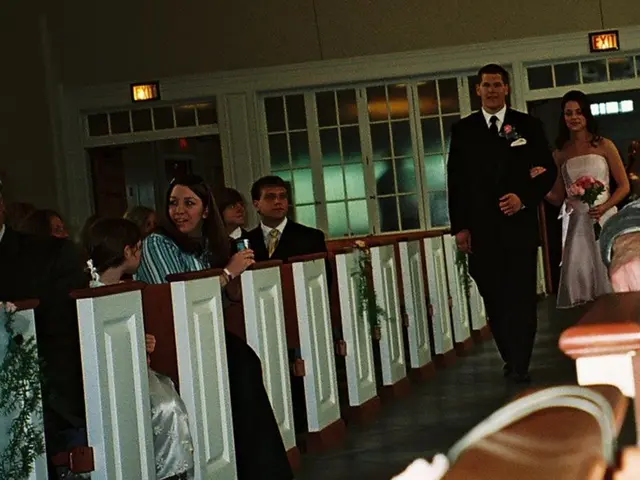A Stroll Down Memory Lane: Uwe Timm Reminisces About World War II
Military personnel arrived and knocked on the door
Just a kid of five when World War II ended, renowned author Uwe Timm grew up amid the ashes of a shattered country. His books often delve into the Nazi era and the Germany that emerged in its wake. From the popularization of the currywurst to the internal strife of the '68ers, Timm's works weave together intricate narratives that illustrate the evolving post-war landscape.
Recently, in an interview with ntv.de, the octogenarian shared intimate memories of his experiences during the war, both harrowing and surreal.
Bombing Raids and Liberation
Timm describes vivid scenes of destruction. He recalls being pushed through the streets of Hamburg, covered in wet towels, during a bombing raid at the age of three. "Little flames in the air everywhere," he says, "the windows' panes had burst due to the heat." Dead bodies littered the streets following bombings, with children like Timm forbidden from looking.
The end of the war unfolded an altogether unfamiliar scene in Coburg, where Timm's family had been evacuated. American soldiers, including the notorious Black Panthers, arrived, shattering the quiet and pushing aside a makeshift barricade. Timm's family hid their remnants of loyalty to the Nazi regime—photographs of Hitler and Wehrmacht uniforms—fearful of the liberation forces.
A Shift in Power
As Germany transitioned from Nazism to democracy, the old guard disintegrated. Former rulers, like the feared local NSDAP leader Veitmeier, were reduced to sweeping streets and facing humiliation from the conquering forces. Women took on leadership roles in their husbands' absences, shifting the balance of power and opening opportunities for social change.
The denazification process was met with varying degrees of success, hamstrung by the escalating East-West conflict and a renewed focus on former Nazi allies in positions of power. Former judges, who had handed out death sentences during the Nazi era, even rose to positions of authority in post-war Germany.
A New Identity Emerges
The post-war era brought a fascination with the Americans—a total departure from the stoic, disciplined German soldiers. From casual language to transformative consumer goods, the Americans posed a stark contrast to the pre-war German mentality. A simple pair of jeans symbolized the shift towards a more casual, unfamiliar, and liberated lifestyle in post-war Germany.
The taste of chocolate, the luxury of tobacco, and the allure of jazz marked a definitive break from the past and set the stage for the cultural shifts that would define the new Germany. Chewing gum, diligently doled out by American forces, was a tangible reminder of this cultural sea change.
The Discovery of the Currywurst
For Berliners, the invention of the currywurst stands as a testament to their resilience and adaptability in the face of adversity. The product of a creative fusion between a traditional German sausage and exotic curry, the currywurst heralded the dawn of a new era in post-war German cuisine. Timm's novel "The Discovery of the Currywurst" explores the cultural significance of this iconic dish in the context of the times.
The Mystery of a Volunteer Soldier
In "At My Brother's Example," Timm grapples with the enigma of his own brother's decision to join the Waffen-SS. His brother died in a field hospital, leaving behind a profound sense of loss and confusion. Timm's exploration of his brother's motivations shines light on a troubling aspect of German history—the willing participation of many Germans in Nazi atrocities.
Acknowledging the complexities of the past, Timm calls for a more nuanced understanding of the post-war German experience, stressing the need for greater civil courage, questioning, and a deeper awareness of the factors that contributed to the acceptance of unquestioned authority.
Volker Petersen spoke with Uwe Timm
Source: ntv.de
- World War II
- History
- 80 years since the end of the war
- National Socialism
- Attack on Ukraine
- Hamburg
- Remembrance
- Uwe Timm, the celebrated author, shares gripping tales from his childhood during World War II, including witnessing bombing raids in Hamburg and the liberation of Coburg by American soldiers.
- In the post-war period, Germany underwent a significant shift in power, with the old Nazi regime dissolving and women assuming leadership roles, heralding social change.
- The denazification process was marred by challenges, including the escalating East-West conflict and the continued presence of former Nazi allies in positions of authority.
- Uwe Timm's novels, such as "The Discovery of the Currywurst" and "At My Brother's Example," delve into the cultural shifts that emerged after World War II, the legacy of National Socialism, and the complexities of post-war Germany.









